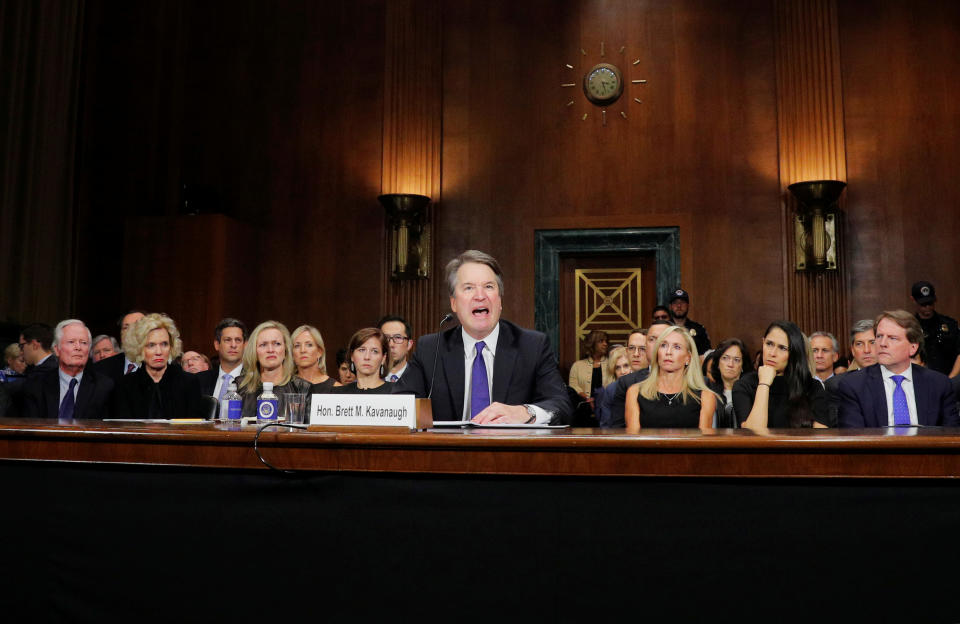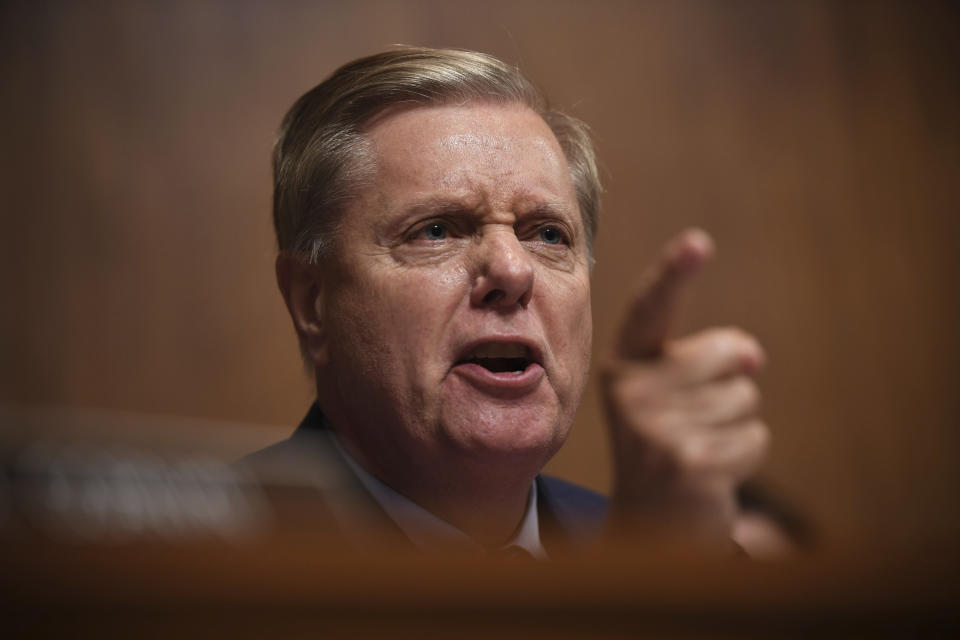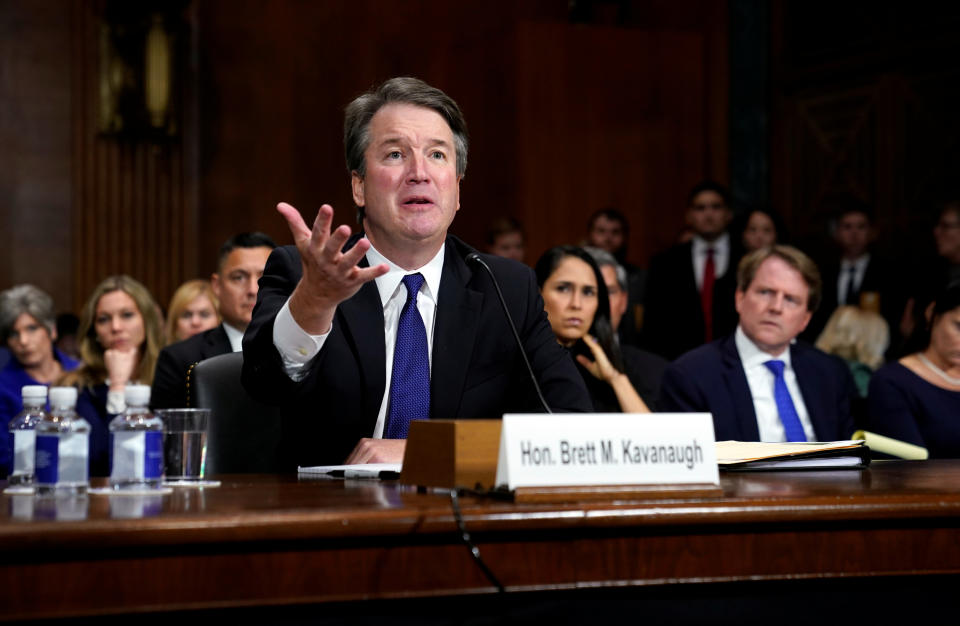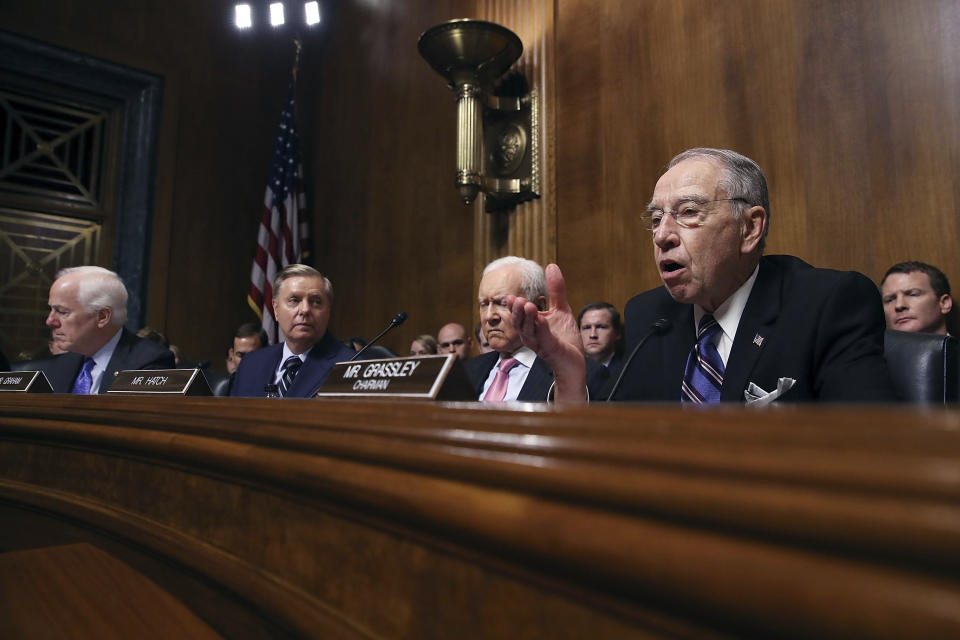Angry and embittered, Kavanaugh casts nomination in partisan terms
WASHINGTON — Frequently angry and sometimes on the edge of tears, Brett Kavanaugh sought to rescue his nomination to the Supreme Court in a dramatic turn before the Senate Judiciary Committee.
Rebutting Christine Blasey Ford’s allegations of sexual assault, Kavanaugh cast himself as the victim, bitterly attacking the 10 Democrats seated before him. He called the initial hearings into his nomination an “embarrassment,” suggesting that he was the subject of “left-wing opposition groups.” Sputtering with rage, Kavanaugh went so far as to claim that his opponents were seeking “revenge on behalf of the Clintons,” though he offered no evidence for that assertion.
“This is a circus,” Kavanaugh said with spite that resounded across the packed Senate hearing room, where the audience included actress-turned-liberal-activist Alyssa Milano and Facebook’s top Washington executive, Joel Kaplan, a friend of Kavanaugh from their time in the George W. Bush administration.
The circus reference was an unmistakable allusion to the 1991 testimony of Supreme Court nominee Clarence Thomas, who called Anita Hill’s allegations during his confirmation process a “circus,” “a national disgrace” and, most famously, a “high-tech lynching.” Thomas won a narrow confirmation from the Senate, despite the seeming credibility of Hill’s accusations.

But Kavanaugh’s acrimony addressed to the Senate Judiciary Committee surpassed even Thomas’s 27 years ago. Never before had a Supreme Court nominee expressed himself in such nakedly partisan terms. To Kavanaugh’s supporters, he is an upstanding public servant defending himself against partisan smears of an unspeakable nature. Detractors saw an entitled political operative enraged that the prize he’d coveted for years would be potentially withheld because of a decades-old allegation. Two other women have gone public with their accusations of sexual assault by Kavanaugh. He has denied them all.
Republicans were obviously heartened by Kavanaugh’s aggressive opening. They quickly dispensed with Rachel Mitchell, the Arizona prosecutor who’d been hired to question Ford earlier in the day. Instead of allowing her to fully question Kavanaugh as well, the Republicans eventually seized control of the hearing from her. For the most part, they used their time to angrily denounce Democrats while lavishing Kavanaugh with sympathy and praise. But whether that show of solidarity with a controversial nominee convinces or backfires remains to be seen.

Sen. Lindsey Graham — a zealous if somewhat late convert to Trump’s cause — described the proceedings as “the most unethical sham since I’ve been in politics.” He called the inquest into Kavanaugh’s alleged sexual misconduct “hell” and seemed to threaten fellow Republicans who had not yet said they would vote for Kavanaugh’s confirmation: “If you vote no, you are legitimizing the most despicable thing I’ve ever seen in my time in politics,” he said.
This seemed to be directed at Susan Collins of Maine, Lisa Murkowski of Alaska and Jeff Flake of Arizona. All three have a tendency to bristle at threats of the kind Graham appeared to be making. They later held a meeting that also included Sen. Joe Manchin, Democrat of West Virginia, who sometimes votes with Republicans. Afterwards, Manchin said the crucial foursome remains undecided. Were they all to vote against Kavanaugh, his nomination to the Supreme Court would fail.
Other Republicans made similar shows of support for Kavanaugh. “I can’t think of a more embarrassing scandal for the United States Senate since the McCarthy hearings,” said Sen. John Cornyn of Texas, alluding to Sen. Joseph McCarthy’s anticommunist witch hunts of the 1950s. To some observers, this indignation rang hollow because some of the same Republicans now rooting for Kavanaugh allowed the nomination of Merrick Garland — an Obama nominee to the Supreme Court, and currently a colleague of Kavanaugh on the D.C. Circuit Court — to languish for 293 days after he was nominated in 2016. Not a single Republican senator met with Garland, though none offered substantive objections to his record or questions about his character. The nomination was ultimately withdrawn.
The dark, angry tone of Kavanaugh and his supporters was a marked contrast from Ford’s testimony earlier in the day. While her testimony was captivating, she showed no ill-will towards the 11 Republican men arrayed before her, or the woman they’d hired — Mitchell — to question her. She even exchanged jokes with Sen. Chuck Grassley, the committee’s chairman.

There were no light-hearted moments during Kavanaugh’s testimony. He angrily interrupted Sen. Dianne Feinstein, the committee’s ranking Democratic member, as well as Sen. Patrick Leahy of Vermont, the only Democrat who was on the Senate Judiciary Committee during the Anita Hill hearings. Asked by Sen. Amy Klobuchar if he’d ever blacked out when drinking, Kavanaugh shot back testily, “Have you?” (He later apologized for the comment, which he’d made shortly after Klobuchar revealed that her own father struggled with alcohol abuse.)
Kavanaugh’s anger eventually gave way to a more measured mood, which allowed Democrats to call into question aspects of his defense. He downplayed prurient, seemingly sexual entries in his high school yearbook, while portraying his long-standing love of beer as inconsequential and harmless. At the same time, he refused to call for an FBI investigation into Ford’s allegations. And he was repeatedly resistant to the Senate Judiciary Committee hearing from Mark Judge, who Ford alleges took part in the assault.
Kavanaugh’s performance seemed less calculated to convince the unconvinced than to please the man who’d nominated him. That, at the very least, he appeared to accomplish. “Judge Kavanaugh showed America exactly why I nominated him,” Trump tweeted after the hearing, as Republicans prepared for an evening conference to discuss the nomination’s prospects. “His testimony was powerful, honest, and riveting.”
The Senate Judiciary Committee will vote on Kavanaugh’s nomination on Friday. The full Senate will likely vote early next week.

_____
More Yahoo News stories on the Supreme Court:
New Kavanaugh allegations don’t change the fact that it’s all about politics
Brett Kavanaugh’s ex-boss: There’s no basis to demand his recusal from Mueller cases
On the calendar with Kavanaugh, a controversial nomination to an appellate court
Whatever happens to Kavanaugh, Trump has already made 2018 the Year of the Woman
Capitol Hill protests mark rising wave of Kavanaugh opposition
Photos: Kavanaugh and Ford testify before the Senate Judiciary Committee


